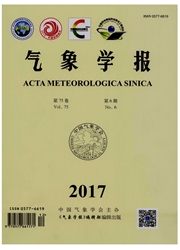

 中文摘要:
中文摘要:
用测站降水量资料和NCEP—DOEII再分析资料等,统计分析了华南春季各月降水量逐年变化的相互关系以及华南4-5月持续性干旱对应的大气环流异常特征,初步探讨了与华南4—5月持续性干旱有关的海温异常及其可能的影响机理。华南春季降水量主要变异型为全区一致型,近30年来华南春季降水量在减少,华南4、5月降水量的逐年变化有显著的同相特征。华南春旱主要是由4—5月的降水持续偏少造成的。在华南4—5月持续干旱年,华南附近高低空都存在一个异常的反气旋,并在华南上空造成异常下沉运动;东亚大槽南支偏弱,不利于中高纬度冷空气南下,因而不利于华南降水。在华南4—5月持续干旱年,热带中太平洋的海温正距平可从前一年12月一直持续到当年5月,其影响华南春旱的机制是:由于赤道中太平洋地区海温正距平,导致该区域的异常辐合上升运动,同时通过罗斯贝波的响应在其西侧即西太平洋赤道南、北两侧低空强迫形成气旋性环流异常,在菲律宾东侧的热带西太平洋上空强迫出异常的上升运动,进而使南海北部和华南地区出现异常的下沉运动,导致干旱;在南海及热带西太平洋上空大气低层出现的偏北风异常也使得来源于南海一西太平洋的水汽输送减弱,不利于华南降水。在华南4—5月持续干旱年,4、5月欧亚大陆中高纬度地区也存在一个持续性的西北一东南向的异常环流波列,其对华南干旱的发生也具有显著的影响作用。
 英文摘要:
英文摘要:
The relationships of interannual variations of the monthly precipitation in spring in South China (SC) and the corresponding pattern of the general circulation to the persistent droughts in April to May (AM) in SC are investigated by using the station-observed rainfall data and the NCEP-DOE reanalysis II data. The linkage between the persistent AM droughts in South China and the preceding winter and spring sea surface temperatures (SSTs) and the possible mechanism of impact of tropical SSTs on the persistent droughts in SC are also discussed. The region-wide inphase pattern is the dominant anomalous mode of spring rainfall in SC. There exists a decreasing trend of the spring rainfall in SC in the recent thirty years. The year to year variations of rainfall in April and May are highly synchronous. The spring drought events mainly result from the notable decrease of rainfall in April and May in SC. In the persistent AM drought cases in SC, there exist anomalous anti-cyclones at the lower and upper levels near SC, and these anticyclones result in anomalous descending motions over SC. Furthermore, the southern part of East Asian trough weakens and is not in favour of the southward invasion of cold air and rainfall in SC. The positive sea surface temperature anomalies (SSTA) in the central equatorial Pacific associated with the persistent AM drought events in SC may appear from the preceding winter till spring. The possible mechanism for the spring drought in SC is as follows: the positive SSTA in the central equatorial Pacific forces anomalous ascending motion over there and forms cyclonic circulation anomalies at the low-level over the two sides of the equator in the western tropical Pacific due to the Rosshy-wave response process, accompanied with the anomalous ascending motion over the western North Pacific east of the Philippines forced, and then cau ses anomalous descending motion over SC, resulting in drought there. On the other hand, the northerly anomalies at the lowlevel over the northern S
 同期刊论文项目
同期刊论文项目
 同项目期刊论文
同项目期刊论文
 期刊信息
期刊信息
